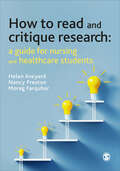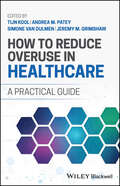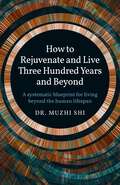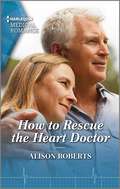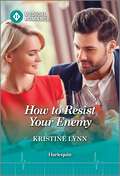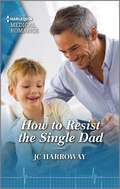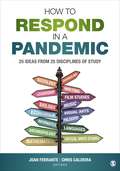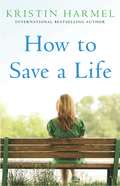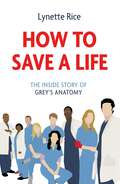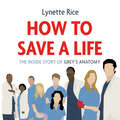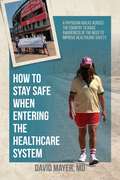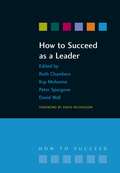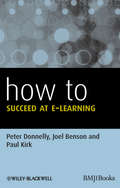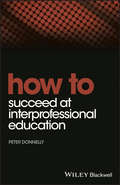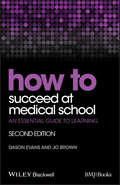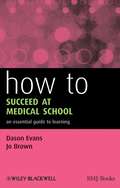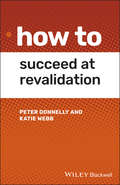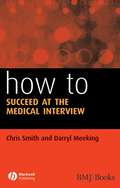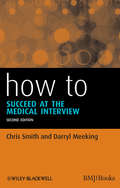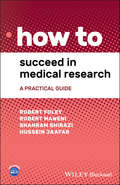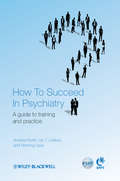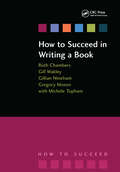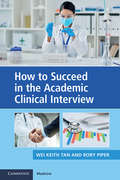- Table View
- List View
How to Read and Critique Research: A Guide for Nursing and Healthcare Students
by Helen Aveyard Nancy Preston Morag FarquharDo you find research challenging to read? Do you struggle to get to grips with a research paper? Understanding, critiquing and using research is a key requirement of students studying nursing and healthcare. This bookwill equip you with the skills you need to understand research and use it in your practice and academic assignments. The approach used in this book is unique: each chapter focuses on a published research paper – one you might be asked to read for a seminar or include in your academic work. In clear, straightforward language, the authors take you through each paper step by step, using it as a basis for exploring the underpinning research method or design, and how it has been reported. Key features: · Each chapter focuses on a different research method by working through a relevant research paper · Identifies the main skills you need for your course: understanding research methods and critiquing articles · Written specifically for nursing and healthcare students by experienced nursing and health care lecturers · Develops your confidence in understanding research by helping you to apply your knowledge to real research papers.
How to Reduce Overuse in Healthcare: A Practical Guide
by Tijn Kool Andrea M. Patey Simone Van Dulmen Jeremy M. GrimshawHOW TO REDUCE OVERUSE IN HEALTHCARE Reduce low-value care with this practical guide Low-value care harms patients, overburdens healthcare professionals, threatens healthcare systems and damages the climate. How to Reduce Overuse in Healthcare: a practical guide is designed to provide practical guidance and tools for healthcare providers, their professional societies and policy makers developing programs to de-implement low-value or unnecessary care. This guide provides a five-step evidence and theory-based framework for developing and evaluating programs such as Choosing Wisely to reduce low-value care and improve patient outcomes. How to Reduce Overuse in Healthcare: a practical guide readers will also find: An author team involved in the leading Choosing Wisely international network Detailed analysis of how to identify potential low-value care areas, select interventions and more Practical, real-world examples at the end of each chapter illustrating examples of overuse and de-implementation How to Reduce Overuse in Healthcare: a practical guide describes the state of the art in de-implementation for healthcare professionals, healthcare administrators and policy makers looking to reduce low-value care in a more effective and evidence-based way.
How to Rejuvenate and Live Three Hundred Years and Beyond: A Systematic Blueprint for Living Beyond the Human Lifespan
by Muzhi ShiIs it possible to live forever? Is immortality within reach of science and scientific breakthroughs? In How to Rejuvenate and Live Three Hundred Years and Beyond, world-class scientist Dr. Muzhi Shi discloses through philosophical discourse his systematic blueprint for living beyond today's human lifespan, illustrating the great potential of state-of-the-art technologies from an insider's perspective. Dr. Shi evaluates current technologies to select essential tools for such a grand goal and offers a unique view of trendy dietary supplements, longevity pills and other biotechnologies - and, most importantly, he answers some of the essential questions about life and death that everyone is curious about.
How to Rescue the Heart Doctor (Morgan Family Medics #2)
by Alison RobertsWill a pediatric heart surgeon finally be able to overcome his family problems and accept love in his life again? Find out what happens in the final book of this multigenerational duet by Alison Roberts.The family they share……brings them together! Pediatric heart surgeon Anthony Morgan is used to fixing tiny hearts yet can&’t mend his own after being estranged from his son. When he meets nurse Elsie, he learns some shocking news—they share a grandson! Having been alone for so long, Elsie welcomes Anthony&’s friendship and is delighted that it develops into something more… But when his family problems seem insurmountable, can Elsie rescue Anthony&’s heart and heal her own, too?From Harlequin Medical: Life and love in the world of modern medicine.Morgan Family Medics Book 1: Secret Son to Change His LifeBook 2: How to Rescue the Heart Doctor
How to Resist Your Enemy
by Kristine LynnTwo rival sports physicians agree to fake date for the premier league press, but what happens when their ruse starts to feel real? Find out in this latest Harlequin Medical Romance by Kristine Lynn! HER GREATEST TEMPTATION? HIM! Working for an elite football club means everything to team physician Olivia. So she&’s blindsided when Dr. Mateo is brought in to work alongside her, certain that there&’s not enough room for the two of them. Until the chemistry they&’re denying catches the public&’s attention after a fiery interaction is broadcast on TV…and infuriatingly good-looking Mateo suggests that becoming a dynamic duo is the ideal way to ensure they both stay. Except, the more they pretend to be the perfect couple, the more real their connection feels…From Harlequin Medical: Life and love in the world of modern medicine.
How to Resist Your Rival
by Rachel DoveIn Rachel Dove&’s latest Harlequin Medical Romance novel, when two scientists are forced to put aside their differences and work together…they discover that one thing they can agree on is their chemistry! Hypothesis: working with a hot doc…will lead to temptation! Robotics scientist Harper dreams of helping prosthetics patients worldwide. The problem? Infuriating neurosurgeon Dr. Dom. This man raises her temper—and her pulse! But despite a series of heated clashes, the layers of his cold exterior begin to melt. Soon, cautious Harper finds resisting her rival an impossible task, as days—and nights!—in the lab blur the lines between professional and deeply personal…From Harlequin Medical: Life and love in the world of modern medicine.
How to Resist the Single Dad
by JC HarrowayWill one stolen kiss with the single dad doc be enough to melt the GP trainee&’s resistance? Find out in the latest Medical Romance by JC Harroway.Her plan is simple:Fight temptation! GP trainee Stella Wright left the idyllic Cotswold village she grew up in, never planning to return…especially not to train at the local practice under Dr. Aaron Bennett. Now, being back is the least of her problems! Aaron is stoic, sexy and a single father, exactly the type of man Stella refuses to get involved with again. Only, one stolen kiss is enough to drive all efforts of resistance from her mind!From Harlequin Medical: Life and love in the world of modern medicine.
How to Respond in a Pandemic: 25 Ideas from 25 Disciplines of Study
by Joan Ferrante Chris CaldeiraHow can an undergraduate college education prepare learners to cope with the current COVID-19 pandemic? This collection of short essays, written by experts in 25 academic fields of study, addresses this very question. Each chapter brings perspective and insight from that discipline, presenting one useful idea and a recommended course of action. This one-of-a-kind resource is ideal for students, instructors, and administrators, particularly during the 2020-2021-academic year when institutions are challenged to continue their educational missions in the midst of a public health crisis that affects every aspect of college life.
How to Respond in a Pandemic: 25 Ideas from 25 Disciplines of Study
by Joan Ferrante Chris CaldeiraHow can an undergraduate college education prepare learners to cope with the current COVID-19 pandemic? This collection of short essays, written by experts in 25 academic fields of study, addresses this very question. Each chapter brings perspective and insight from that discipline, presenting one useful idea and a recommended course of action. This one-of-a-kind resource is ideal for students, instructors, and administrators, particularly during the 2020-2021-academic year when institutions are challenged to continue their educational missions in the midst of a public health crisis that affects every aspect of college life.
How to Save a Life
by Kristin HarmelGroundhog Day meets Grey’s Anatomy in this heartfelt novella with a hint of magic from the internationally bestselling author of The Sweetness of Forgetting and The Life Intended, in which a woman with only a short time to live discovers she can repeat the same day over and over until her life feels complete.When a pediatric oncology nurse receives a devastating prognosis—she has just weeks left to live—she finds unexpected comfort from a patient. Her young friend shares a life- and death-changing secret: it is possible to live the same day over and over again until she’s experienced a truly full life. Thus begins a heartbreaking and joyful journey of love, friendship, and self-discovery, as the brave nurse only truly learns how to live in the face of death. Kristin Harmel, whose work has been called “immersive and evocative” (Publishers Weekly), “absorbing…well-paced and warmhearted” (Kirkus Reviews), and “absolutely enthralling” (Fresh Fiction), infuses her poignant, uplifting novella with a dash of magic and a hefty dose of heart.
How to Save a Life: The Inside Story of Grey's Anatomy
by Lynette RiceThe first inside story of one of TV's most popular and beloved dramas, Grey's Anatomy.' <P><P>More than 15 years after its premiere, Grey's Anatomy remains one of the most beloved dramas on television in the US and the UK. It continues to win its time slot and has ranked in the Top 20 most watched shows in primetime for most of its 17-season run. It currently averages more than 9 million viewers each week. Now it's time to hear from the people who made the show happen. <P><P>A cultural touchstone, it introduced the unique voice and vision of Shonda Rhimes, it made Ellen Pompeo, Sandra Oh and T.R. Knight household names, and injected words and phrases into the cultural lexicon like 'McDreamy,' and 'you're my person.' And the behind-the-scenes drama has always been just as juicy as what was happening in front of the camera, from the high-profile firing of Isaiah Washington to Katherine Heigl's fall from grace and Patrick Dempsey's shocking death episode. The show continued to haemorrhage key players, but the beloved hospital series never skipped a beat. Lynette Rice's How to Save A Life takes a deep dive into the show's humble start, while offering exclusive intel on the behind-the-scenes culture, the most heartbreaking departures and the more polarizing plotlines. It's the perfect gift for all Grey's Anatomy stans out there. <P><P><b>A New York Times Best Seller</b>
How to Save a Life: The Inside Story of Grey's Anatomy
by Lynette RiceThe first inside story of one of TV's most popular and beloved dramas, Grey's Anatomy.More than 15 years after its premiere, Grey's Anatomy remains one of the most beloved dramas on television in the US and the UK. It continues to win its time slot and has ranked in the Top 20 most watched shows in primetime for most of its 17-season run. It currently averages more than 9 million viewers each week. More than that, it's been a cultural touchstone. It introduced the unique voice and vision of Shonda Rhimes, it made Ellen Pompeo, Sandra Oh and T.R. Knight household names, and injected words and phrases into the cultural lexicon like 'McDreamy,' and 'you're my person.' And the behind-the-scenes drama has always been just as juicy as what was happening in front of the camera, from the high-profile firing of Isaiah Washington to Katherine Heigl's fall from grace and Patrick Dempsey's shocking death episode. The show continued to haemorrhage key players, but the beloved hospital series never skipped a beat. Lynette Rice's How to Save A Life takes a totally unauthorized deep dive into the show's humble start, while offering exclusive intel on the behind-the-scenes culture, the most heartbreaking departures and the more polarizing plotlines. It's the perfect listen for all Grey's Anatomy stans out there.(P) 2021 Blackstone Publishing
How to Stay Safe When Entering the Healthcare System: A Physician Walks across the Country to Raise Awareness of the Need to Improve Healthcare Safety
by David MayerThis book is an urgent call to action centering on the author's thirty-five-year mission to raise awareness of the 250,000 lives that are lost each year to preventable medical harm and the harm faced by healthcare professionals in the form of workplace vi
How to Succeed as a Leader (How To Succeed Ser.)
by Richard Jones Kay Mohanna David Wall Ruth ChambersThis work includes Foreword by David Nicholson - Chief Executive, National Health Service of England. In the past, there has been too little emphasis and investment made in developing leaders in healthcare. People have become leaders without being prepared or trained or supported in the role. Individuals need to understand the context, the concept and models of good leadership, the practical steps to becoming a good leader, and how to sustain the various components of a well functioning and effective organisation, whether that is a large NHS trust or hospital department, a clinical group or practice team. This guide has been written by a range of writers from organisational consultancy and NHS backgrounds who are all experienced in developing and supporting leaders, planning and providing education, and change management. It is specially designed for independent learning, with answers to frequently asked questions, self-assessment exercises and helpful tips. "How to Succeed as a Leader" is ideal for all healthcare professionals in (or aspiring to) leadership roles. It also provides inspiration for academics and workplace educators, managers and leaders in government, strategic health authorities and workforce deaneries. 'There is constant reorganisation and a changing culture in our health service. Good leadership is essential to address the changes required and take others with you so that the service can function effectively. There has been an amateurish approach to leadership in the NHS in the past, where people have become leaders without being prepared or trained for the role or supported in it. This book is all about presenting you with a practical approach to becoming a competent leader, to prepare you to lead in a positive way and realise your responsibilities as a leader.' From the Preface.
How to Succeed at E-learning
by Paul Kirk Peter Donnelly Joel BensonA basic guide to getting the best from e-learning for medical students, teachers and all healthcare professionalsHow to Succeed at e-Learning answers the needs of all healthcare professionals either starting or continuing their studies but not knowing where to begin with e-learning. It is a valuable guide for learners in undergraduate and postgraduate medicine as well as related health professionals and essential for teachers of medicine who are beginning to transfer from print to electronic teaching and need to understand effective methods of presentation.
How to Succeed at Interprofessional Education (How To)
by Peter DonnellyHealthcare professionals work not only within multidisciplinary teams but also with allied health and non-healthcare professionals. How to Succeed at Interprofessional Education is a practical introduction to the concepts of interprofessional education (IPE) within medicine. It provides the rationale and framework for the effective delivery of IPE in a range of health care contexts. The contents include definitions, the evidence that IPE is effective, and the principles to ensure successful delivery. A series of examples of IPE in different clinical settings is described that lead to improved decision making and improved clinical care for patients.
How to Succeed at Medical School
by Dason Evans Jo BrownCan you adapt to the wide variety of learning environments in medicine? Can you show your best abilities in the exams at the same time as learning to be a doctor? Can you balance your studies with an enjoyable social life? Can you develop your professionalism and manage your 'digital footprint'? How to Succeed at Medical School will help you learn these vital skills, and much more. Written by experienced medical school teachers and packed full of case studies, illustrations, quotes from other students, tip boxes, exercises, portfolios and learning techniques to help you communicate, study and revise - it's an essential resource to help you thrive at medical school. This thoroughly updated second edition includes new chapters on Professionalism and Teaching, and provides invaluable insight into what to expect from the start of medical school right through to the start of your medical career.
How to Succeed at Medical School: An Essential Guide to Learning (How To #25)
by Dason Evans Jo BrownCan you adapt to the wide variety of learning environments in medicine? Can you learn for exams at the same time as training to be a doctor? Can you stay focused on the future while getting today’s job done? Can you achieve a life-work balance? How to Succeed at Medical School will help you learn these vital skills, and much more. This excellent guide to the study skills essential for surviving and thriving at medical school gives you insight into what to expect, covering the early days right through to clinical attachments. With case studies, illustrations, quotes from other students, tip boxes, exercises, portfolios, and learning techniques to help you communicate and to study and revise — it’s jam-packed to help you succeed! Written by experienced medical school teachers, this is your guide from the start of medical school to the start of your medical career. Pre-publication reviews: "… I learned a lot, found the enthusiasm of the text motivating and inspiring and really enjoyed reading it." –Second year medical student, Royal Free and UCL "I just wish this book had been available when I started my clinical placements." –Second year medical student, University of Liverpool "It helps aid students to learn effectively and efficiently and even tells you how you will know when you know enough!" –Professor Parveen Kumar
How to Succeed at Revalidation (How To)
by Peter Donnelly Katie WebbDoctors in the UK are required to provide evidence of their fitness to practice—all doctors registered with the General Medical Council (GMC) need to revalidate to maintain their registration. How to Succeed at Revalidation contains up-to-date information on the current regulatory framework and step-by-step guidance to the entire revalidation process. Offering expert advice on how to undertake the process from the perspective of the appraisee, the appraiser, and the employer, this practical, quick-reference guide covers each of the Good Medical Practice (GMP) domains: Knowledge, Skills and Performance; Safety and Quality; Communication, Partnership and Team Work; and Maintaining Trust. Throughout the text, numerous examples describe different models of appraisal and reflection, identify activities that map to each domain, and demonstrate how revalidation requirements can be achieved in the course of daily practice. This much-needed guide: Covers regulatory processes in medicine and healthcare from both UK and international perspectives Reviews the background that led to the implementation of revalidation Discusses the new GMP requirements for all doctors in the UK Explores the possible future of revalidation How to Succeed at Revalidation is essential reading for all qualified and trainee doctors, undergraduate and postgraduate learners, tutors and trainers seeking to navigate the revalidation process in the UK.
How to Succeed at the Medical Interview (How To #27)
by Chris Smith Darryl MeekingDoctors are likely to undergo several interviews of different types during their career, and this new title in the popular 'How to' series aims to guide the medical professional through the steps necessary to thoroughly prepare for this competitive process. Contents include: Discussion of the different types of medical interview How to prepare for interview How to optimise your performance Information about common questions and how best to answer them Information about knowledge-based questions currently asked Coverage of questions that test generic skills and how to answer them How to prepare for competency-based assessments and tasks. An ideal companion for all health professionals faced with an interview, How to Succeed at the Medical Interview will assist in building confidence and ensuring that candidates are as thoroughly prepared as possible.
How to Succeed at the Medical Interview (How To #42)
by Chris Smith Darryl MeekingHow to Succeed at the Medical Interview provides candidates with a competitive edge. It reduces the likelihood of unexpected questions or situations and helps improve confidence before and during the medical interview. This new second edition includes updated content on changes to the structure of healthcare and how this affects both the application and interview process. It details the types of questions that will be asked at medical interviews and also provides improved guidance for overseas doctors and healthcare professionals and for those seeking to practice abroad. How to Succeed at the Medical Interview is the ideal guide for Foundation Programme trainees, Specialist Registrars and General Practitioner trainees. It is also valuable for healthcare professionals facing competitive medical interviews at any stage of their career.
How to Succeed in Medical Research: A Practical Guide (How To)
by Robert Foley Robert Maweni Shahram Shirazi Hussein JaafarHow to Succeed in Medical Research is a practical resource for medical students and junior doctors across all specialties. Designed for busy readers seeking to distinguish themselves in a highly competitive environment, this concise yet comprehensive guide provides step-by-step advice on selecting a project, finding a mentor, conducting a study, analysing results, publishing a paper, communicating findings, and much more. Presented in an accessible and conversational style, 14 succinct chapters walk readers through the essential stages of their research journey, from the initial steps to getting involved in research as a medical student, to effectively balancing clinical work, scientific research, and other academic pursuits early in your career as a healthcare professional. The book is packed with real-world case studies and expert tips to help readers apply the content directly in their own studies and careers. Straightforward and easy-to-use, this valuable guide: Covers a variety of clinical research and presentation skills using clear and engaging language Provides detailed guidance on writing a paper, conducting a clinical audit, creating a CV and portfolio, and other key proficiencies Develops writing skills for literature reviews, critical appraisals, and case reports Discusses how to further medical careers through research electives, PhD studies, teaching, and quality improvement projects Offers a range of helpful learning features including objectives, key points, case studies, review questions, and links to references and further readings Includes PowerPoint templates for oral presentations and posters via a companion website How to Succeed in Medical Research: A Practical Guide is an ideal resource for medical students, junior doctors and other early career medical professionals.
How to Succeed in Psychiatry
by Henning Sass Iris Calliess Andrea FiorilloAimed at recently qualified psychiatrists or those looking to qualify soon, How to Succeed in Psychiatry is not a source of clinical information but a survival guide to help you through the first years practising psychiatry. This book covers the topics you won't find in standard textbooks. It deals with daily problems and practical solutions for young psychiatrists. Psychiatric training is less team based than other specialties, so there is less opportunity for learning from colleagues than one would expect: this book helps to fill that gap.The book opens with an overview of psychiatry training, describing the similarities and differences among various countries. Subsequent chapters address the opportunities for research and how to publish the results. Psychotherapy and community psychiatry each merit their own chapter on training. Next, the book guides you through the transition phase into a job, discussing opportunities in both the public and private sectors and considering how to choose the best career for you. It reviews important general considerations, such as ethics, professionalism, leadership and management, how to avoid stress and burn out, and how to liaise with other specialties. The book closes with an account of the role of psychiatry associations and continuing professional development.Written by early career psychiatrists from around the world, this book provides invaluable first-hand experience to all those wishing to embark on a career in this exciting discipline.Practical tips for young psychiatrists starting their careers on the wards or in private practice Advice on the transition phase at the end of training, career choice and job opportunities
How to Succeed in Writing a Book: Contemporary Issues In Practice And Policy, Parts 1&2, Written Examination Revision Guide (How To Succeed Ser.)
by Ruth Chambers Gill Wakley Gilian Nineham Gregory Moxon Michele TophamThis highly practical text is full of interesting tips and words of advice covering all stages in publishing including proposals, selection of authors, writing, editing, finding the right publisher, managing other authors, self discipline, marketing, and finance. "This is a 'how to do it' book for anyone considering writing a book. It helps inexperienced or frustrated authors realise where they may be going wrong. Learn how to write to be understood. Pick up tips from the authors of this book- who have all been in the writing and publishing business for a long time. Although, the book focuses on writing for health and social care, most of the information and guidance about getting published can be transferred to any kind of book or publication." - From the Preface.
How to Succeed in the Academic Clinical Interview
by Wei Keith Tan Rory PiperAcademic clinical posts offer doctors the highly rewarding opportunity to maintain both clinical and research careers, but these opportunities are fiercely competitive. This book provides medical students and doctors-in-training with a complete guide to preparing, applying and interviewing for such posts. Providing guidance on the typical UK academic pathways (including Academic Foundation Programme (AFP), Academic Clinical Fellowship (ACF), and Academic Clinical Lectureship (ACL)), candidates will learn how to choose a programme that suits their needs and experience. They will also get practical tips on how to best showcase their achievements and work portfolio in order to submit the highest quality application. A range of model answers to application and in-person questions are provided, together with a mock interview section demonstrating how to approach tricky questions and interviewers. Prepare for successful academic clinical interviews by following the tips and advice from authors who have excelled at their own interviews.
